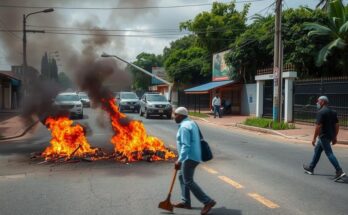The article examines the political situation in Kenya during recent youth protests, highlighting its unique resistance to military coups that are prevalent in many other African nations. It discusses how historical civic activism has shaped Kenya’s political environment, preventing the common trajectory of military intervention and subsequent civil disorder experienced elsewhere. The piece emphasizes the decentralized nature of Kenyan youth movements as a crucial factor in this stability.
The recent youth unrest in Kenya highlights a unique political dynamic in the region, contrasting sharply with historical trends elsewhere in Africa. In many cases, mass protests lead to military coups, as seen in nations such as Sudan, Ethiopia, and Uganda, where military takeovers brought about significant disruption and often tragic outcomes. Kenya, however, has managed to avoid both a military coup and outright chaos. Instead, the country currently exists in a political stalemate, where the initial grievances prompting the protests remain unaddressed. The persistence of civic activism in Kenya, rooted deeply in the nation’s history, plays a pivotal role in shaping its political landscape. The military, historically less inclined to intervene politically, has further contributed to this stability. The 1982 coup attempt, which took the nation by surprise and was swiftly quelled, underscores Kenya’s distinct absence of a coup culture common in other parts of the continent. In contrast, many African nations have experienced cycles of coups, often driven by military leaders who initially seize power on the backs of public discontent but fail to meet the expectations of those they claim to represent. Historical figures such as Capt. Thomas Sankara of Burkina Faso, and Uganda’s General Idi Amin, portray the precariousness of military governance — where idealistic promises yield to betrayal and disillusionment. Capt. Sankara’s tragic demise at the hands of a once-ally exemplifies how such regimes can often devolve into prolonged cycles of corruption and oppression. Similarly, Gaddafi’s transition from revolutionary idealist to chaotic despot illustrates the unpredictable nature of power acquired through military means. In Uganda, Amin’s initial popularity transformed into a reign of terror, marked by arrogance and degradation as he alienated political allies and neglected governance. International forces, including neighboring nations, at various points attempted to restrain Amin’s regime but ultimately could not prevent his downfall — a fate that embodies the failures arising from military rule. Conversely, Kenya has avoided catastrophic military uprisings that have plagued other regions. The youth movements in Kenya remain strategically decentralized, thereby resisting co-option and maintaining a focus on democratic process rather than violent revolution. This unique blend of civic engagement alongside a non-interventionist military has at least temporarily staved off both coups and a descent into chaos. Ultimately, this situation reflects a more hopeful vision for political change that prioritizes civic action and engagement over military involvement and upheaval.
The article discusses the political landscape in Kenya amidst recent unrest, contrasting it with historical trends of military coups in other African nations. It reflects on the dynamics of youth protests and the role of military interventions as seen in countries such as Uganda, Sudan, and Ethiopia. The emphasis is placed on the importance of civic activism in Kenya and the lack of military engagement in political crises, which has contributed to a unique stability in its political environment, as well as the country’s historical resistance to military takeovers that have characterized other nations on the continent.
In conclusion, the article articulates how Kenya effectively navigates political crises without yielding to military intervention or civil disorder. The longstanding tradition of civic activism empowers the populace and restrains military dependency, which has oftentimes led to disastrous outcomes in other nations. The current political stalemate, while troubling, reflects Kenya’s capacity for resilience and potentially paves the way for genuine, democratic reforms driven by the youth of the nation.
Original Source: www.theelephant.info




